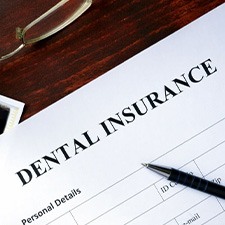
Tooth Extractions – Allen, TX
Tooth Removal Treatment You Can Trust
While no one wants to be told that their tooth needs to be removed, sometimes teeth can become so damaged that they are not only viable in the mouth but put neighboring teeth at risk in the process. In the event that we believe a tooth needs to be removed, Dr. Lewis will utilize photos and radiographs so you can see for yourself why she might have concerns. We’ll also make sure you’re comfortable and prepared for your treatment before moving forward with tooth extractions in Allen, TX.

Why Choose Allen Smile Design for Tooth Extractions?
- Dental Implant Treatment Available
- Provides Nitrous Oxide Sedation for Nervous Patients
- Detailed Examination and Diagnostics Performed
When Do Teeth Need to Be Extracted?

Teeth are extracted for a number of reasons, but the most common by far is due to untreated tooth decay. Alternatively, teeth can be extracted if they suffered a severe fracture that cracked the tooth all the way down to the root. They may also be removed in order to make room for orthodontics or if they are causing harm to neighboring teeth (which is common for wisdom teeth.) We’ll always be clear about why an extraction is needed.
The Tooth Extraction Process

Tooth extractions are pain-free and simple procedures that our team at Allen Smile Design is able to complete in-office. Before we begin, we will administer a local anesthetic to the area that will be treated to numb it, ensuring you won’t feel any discomfort throughout your procedure.
Dr. Lewis will start by carefully lifting the tooth out of its socket. She’ll then wiggle it free from any connecting tissues using a pair of dental forceps. Once the tooth is free, she will lift it out of the socket. Afterward, she may also stitch the extraction site closed to keep the blood clot safe and promote faster healing.
Tooth Extraction Aftercare

After a tooth extraction in Allen, there are certain steps you should take to prevent infection and promote faster healing. Here are a few aftercare instructions you’ll need to take to ensure a faster and complication-free recovery:
- Care for the surgical site. One of the most important aspects of the recovery process is taking care of the blood clot that forms in the socket where your tooth used to be. If you fail to do so, it can lead to painful complications like a dry socket.
- Keep your mouth clean. Brush, floss, and rinse regularly with warm salt water to eliminate harmful bacteria from your mouth, being sure to be careful when cleaning around the extraction site.
- Take pain medication. Prescribed or over-the-counter pain relievers can reduce inflammation and alleviate your discomfort.
If at any point following your treatment you have questions or concerns, don’t hesitate to contact our team.
Understanding the Cost of Tooth Extractions

We don’t take tooth extractions lightly and want to be just as considerate with your budget! Many different factors can affect the specific cost of your emergency treatment, but we can give you a general idea of what to expect below. If affording dental care sends chills up your spine, don’t worry. We also cover ways to help make your bill manageable. For more information or clarification, don’t hesitate to get in touch with our friendly team.
Factors That Can Affect Tooth Extraction Cost

As noted, many different factors can make your tooth extraction more or less costly than average. Here’s what we’ll take into account:
- The affected tooth. Some pearly whites are more difficult to remove than others. A back molar, for example, is generally harder to reach, and will take more time to extract. If your troubled tooth is in a tricky spot, it’s likely to increase service costs.
- How many teeth need to be removed. Tooth extractions are priced individually, meaning removing multiple teeth is more expensive than removing one.
- Whether it’s best to perform a simple extraction or impacted extraction. Simple extractions are, well, simple, whereas impacted extractions require minor surgery. You’ll see this reflected in the pricing.
- The follow up replacement. It’s prudent to consider your tooth replacement costs when thinking about extraction expenses. Some options are more costly than others, but might be worth the investment depending on your preferences.
Does Dental Insurance Cover Tooth Extractions?

Typically, dental insurance covers around 50% of both simple and impacted extraction costs. However, you’ll have to meet your annual deductible for this benefit to be applied, and not all policies are the same. It’s a good idea to double-check the fine print of your dental insurance plan to make sure you have coverage for tooth extractions.
Dental insurance can be confusing, but since we accept a wide variety of plans, our team is familiar with how it works. We’d be more than happy to help you navigate the details of your policy if you get overwhelmed, so feel free to ask for our assistance!
Other Options for Making Tooth Extractions Affordable

We understand that not everyone has access to dental insurance. Still, we want to help you and your budget in whatever way we can. That’s why we also accept flexible financing plans from CareCredit and Lending Club. With their little-to-no interest payment options, you can break your final tooth extraction bill down into smaller monthly payments, sort of like a subscription service. Let us know if you think this option could benefit you, and we’ll make sure you have all the information you need to get started.
Tooth Extraction FAQs
Does getting a tooth extracted hurt?
Many patients are hesitant to move forward with an extraction because the thought of getting a tooth pulled can be downright anxiety-inducing. Not only are they worried about the procedure, but the pain it’ll bring as well. Fortunately, Dr. Lewis will numb your mouth before the extraction to ensure you’re comfortable while it happens. It’s worth noting that you’ll likely experience mild soreness and discomfort for the first few days following the procedure. However, you can easily manage it by diligently following your aftercare instructions and getting lots of rest. If your pain worsens or you begin to show signs of an infection (i.e., fever), call our office right away for assistance.
How long does it take to recover from a tooth extraction?
In most cases, patients are able to make a complete recovery within two weeks following a tooth extraction in Allen. However, most people are able to return back to work the day after their procedure.
Is there an alternative to a tooth extraction?
It depends on the reason behind your tooth extraction. If you need to get a tooth pulled because you have severe dental decay, root canal therapy may be an effective alternative. If it’s because you have advanced periodontal disease, root scaling and planing might be another option. However, those treatments may not be a viable choice for you if Dr. Lewis is recommending an extraction. Since dentists will do everything possible to save natural teeth, they will only recommend the procedure when it’s the last resort to getting your oral health back to its best shape.
What risks are involved with tooth extractions?
Even though tooth extractions are considered to be extremely safe, there are a few risks to be aware of. One of the biggest risks of this procedure is infection. If you don’t handle it well, it can spread to the rest of your body and potentially become life-threatening. Another significant risk is dry socket, a painful complication that happens when you fail to take proper care of the blood clot that forms on the surgical site. The good news is that you can drastically lower your chances of these risks by diligently following the aftercare instructions you were given.